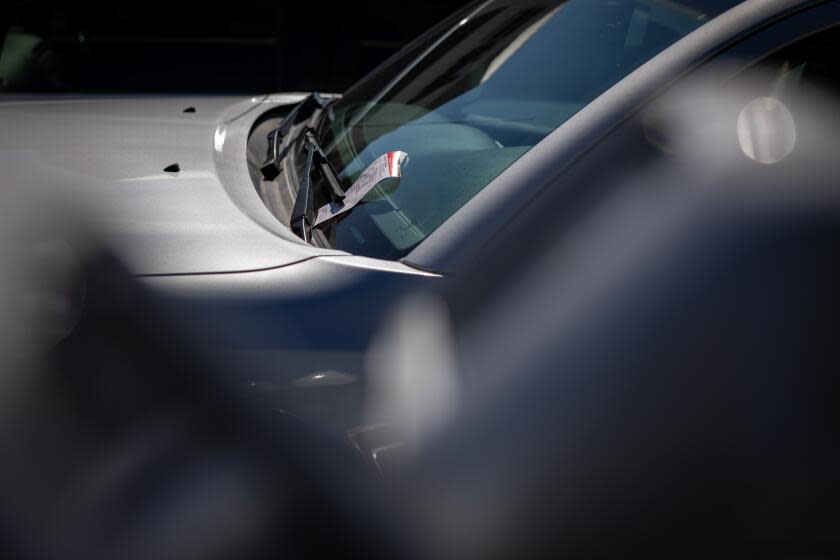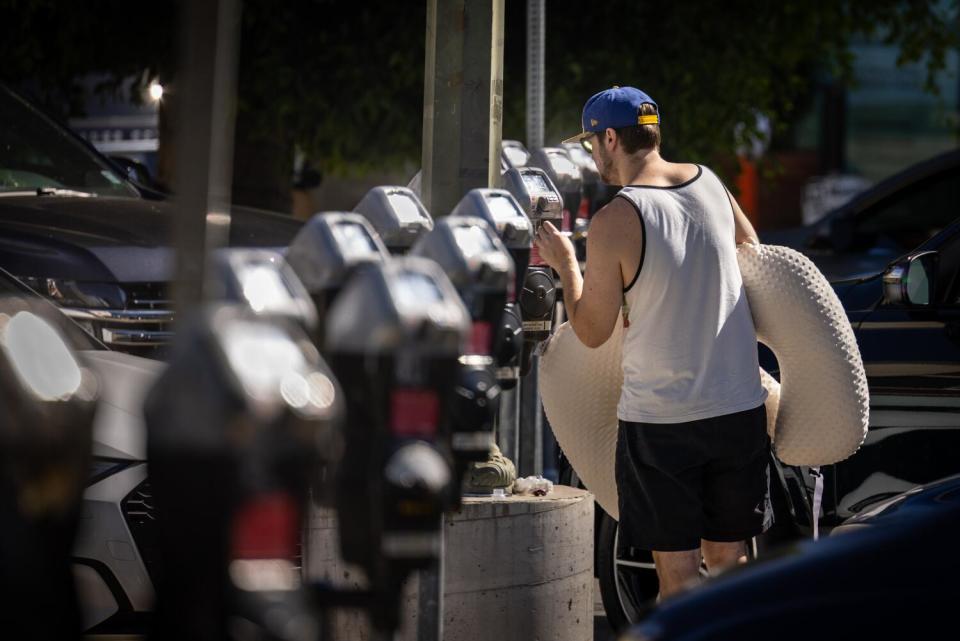These are the parts of L.A. that get the most parking tickets. Our guide to avoiding them

The red-and-white slip of paper was wedged so inconspicuously under her windshield wiper that 21-year-old Ava Lind nearly missed it.
“Oh my God,” she said, snatching up the parking ticket. Lind's quick stop in Larchmont Village cost her the price of an iced coffee — plus a $63 citation.
She didn't know when she parked her black Volvo that Friday afternoon that she'd landed in one of L.A.'s hottest parking ticket zones.
That same day, traffic officers dropped 30 other tickets onto cars parked along Larchmont Boulevard, a busy street in mid-city L.A. lined with ice cream shops and boutiques. Half of those were for expired meters.
A Times analysis of parking ticket data in Los Angeles from Jan. 1 to July 31 pinpointed top spots where drivers get written up. Trying to avoid a ticket? Following the rules is your best bet. Here’s also a breakdown of where and when tickets are issued:
Prime ticket-writing time
You can get ticketed at any time — even when much of the city is asleep. In the time period the Times analyzed, thousands of tickets were written for each hour on the clock. But ticketing really picks up at 8 a.m. and maintains that brisk pace until 2 p.m, when it starts to decrease into the night.
Of all citations issued through the end of July, about 30,000 were issued between 7 and 8 a.m. — quadrupling to nearly 128,000 tickets in the following hour, after parking meters open.
Other spikes were from 10 to 11 a.m. and noon to 1 p.m. Late at night, most tickets were for parking in residential areas without a permit — what the Los Angeles Department of Transportation calls preferential parking — and in the early hours, for parking in a red zone.
The most common parking violation
When Anika Reitman first moved to Los Angeles in 2012 to pursue acting, street sweeping tickets made up the majority of her fines.
“The quote in the Bible is, ‘Who amongst us hasn’t gotten a street sweeping ticket in Los Angeles?’” she joked.
It is true that traffic officers dish out the most tickets to drivers parked in street sweeping zones. The $73 tickets made up nearly 30% of the tickets issued in the city through July, of those that were labeled with a violation description.
The No. 2 reason for parking tickets was motorists overstaying meters, followed by parking in red zones. Tickets for preferential parking and missing license plates were high on the list, as well.
The top places for street sweeping tickets
There are nearly 2,400 miles of streets across L.A. where the city’s fleet of sweepers clean up trash every other week, preventing debris from clogging storm drains and reaching waterways. The $73 fine is all too familiar for those who have misread the signs or forgotten to move their car before parking enforcement rolls by.
The block in Los Angeles where the most drivers have been caught parking during street sweeping hours is 11100 Weddington Street in North Hollywood, followed by the 6300 block of Commodore Sloat Drive in Carthay, and the 600 block of Veteran Avenue in Westwood.
Of the top 20 blocks that racked up the most street sweeping tickets, a quarter of them were in Westwood.
The number of street sweeping tickets issued dipped tremendously in 2020, when the city stopped writing up people for seven months amid the start of the COVID-19 pandemic. When the city resumed fining violators, the number of tickets climbed again — although, for the past two years, counts have yet to return to pre-pandemic levels. That can largely be attributed to the city cutting its street-sweeping schedule in half when it switched from a weekly to biweekly calendar in early 2021.
The most-watched meters
There are more than 35,000 parking meters across the city that cost anywhere from 50 cents to $6 an hour to park — and if you exceed the time limit, you’ll have to pay $63 more.
See a gym, bakery or salon nearby? Meters are likely in high demand. The top 10 ticketed blocks for overstaying a meter were all walkable stretches of neighborhoods, lined with Pilates studios, Italian restaurants and ice cream shops.
Notable areas were the neighboring blocks of 11600 and 11700 Barrington Court West in Brentwood, which combined saw 2,130 red-and-white slips through July — and the neighboring blocks of 100 and 200 North Larchmont Boulevard in Larchmont Village, which combined saw 2,165.
Aaliyah Mcgruder, a security guard at Wells Fargo, is stationed in the bank's parking lot on Larchmont Boulevard. Just four days into starting her job, she said she noticed parking enforcement officers strolling around in their brown uniforms “at least five times a day.”
"They’re everywhere,” she said. “Everybody wants to walk down this lovely street with these bakeries and feel the fresh air, sun hats on. But if you don’t pay those meters, you’ll be getting a ticket.”

The goal of metered parking is to get people in and out of shopping areas, so more people have a chance to park, according to the city transportation department.
"The combination of more people and regulations results in a higher likelihood of vehicles violating posted parking regulations and, therefore, a greater number of citations being issued in these areas," said Colin Sweeney, a spokesperson for the department.
Cash collected at meters is a specified funding source in the city’s budget. The special parking revenue fund, which also includes money from city parking lots, pays for parking operations, with whatever is left going into the reserve fund — where unrestricted cash is set aside for unexpected expenses and revenue shortfalls.
The highest red zone risk
Although the top blocks for expired meter and street sweeping tickets are spread across the Westside and Central L.A., there’s a clear portion of the city where enforcement officers write up the most $93 tickets for red zone parking.
Through July, the top 20 blocks for red zone fines were in downtown Los Angeles, and west into Westlake and Koreatown — the two most densely populated neighborhoods in the city.
The top two blocks were in Koreatown. The 600 block of South Mariposa Avenue had 428 tickets, and two streets over, motorists in the 700 block of South Normandie Avenue got another 354.
In the 600 block of South Hill Street in downtown, 337 such tickets were written.
Some colored curbs that are restricted during the day are all-clear for parking after 6 p.m. and on Sundays. Yellow curbs, which indicate commercial loading zones, become restricted at 7 a.m., and green curbs, reserved for short-term parking, become restricted at 8 a.m.
But don’t risk that red curb. Even at 2 a.m., you could get ticketed.
You got a ticket. What now?
If the Parking Violations Bureau doesn't receive your payment within 21 days of when the citation was issued — or 14 days from the date of the first overdue notice — expect to be hit with a late fee, which could double the cost.
Money collected goes to the city's general fund, which is where the police, fire and public works departments get funding. Last year, the city issued more than 2 million tickets, costing L.A. drivers more than $145 million in fines. Revenue from parking tickets is a line item in the city budget, too, with $115 million penciled in for the 2023-24 fiscal year.
Payments can be made in person, online, by phone or by mail. Those who qualify as low-income can request to pay the fine in installments. People experiencing homelessness may qualify to pay their ticket through community service.
And if you want to contest a citation, be ready to go through a three-step process that includes an administrative review, a hearing and a court visit. More information on the process is available online at ladotparking.org.
This story originally appeared in Los Angeles Times.

